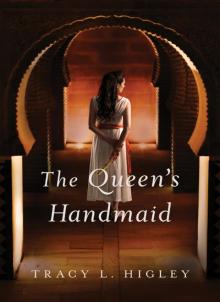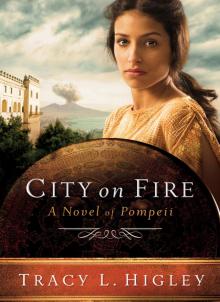- Home
- Tracy L. Higley
Keeper of the Flame
Keeper of the Flame Read online
© 2009 by Higley Enterprises, Inc.
All rights reserved. No portion of this book may be reproduced, stored in a retrieval system, or transmitted in any form or by any means—electronic, mechanical, photocopy, recording, scanning, or other—except for brief quotations in critical reviews or articles, without the prior written permission of the publisher.
Published in Nashville, Tennessee, by Thomas Nelson. Thomas Nelson is a registered trademark of HarperCollins Christian Publishing, Inc.
Thomas Nelson, Inc., titles may be purchased in bulk for educational, business, fund-raising, or sales promotional use. For information, please email [email protected].
Publisher’s Note: This novel is a work of fiction. Names, characters, places, and incidents are either products of the author’s imagination or used fictitiously. All characters are fictional, and any similarity to people living or dead is purely coincidental.
ISBN 978-1-4016-8747-2 (e-book)
To my dear friends
Kelly Shennett
Michelle King
Connie Taylor
Amie Shumski
Dawn Hill
and
Joan Savoy
Through our many years of friendship, you have taught me so much about what it means to truly be a woman of beauty. I love you all.
Contents
Acknowledgments
Word List
One
Two
Three
Four
Five
Six
Seven
Eight
Nine
Ten
Eleven
Twelve
Thirteen
Fourteen
Fifteen
Sixteen
Seventeen
Eighteen
Nineteen
Twenty
Twenty-One
Twenty-Two
Twenty-Three
Twenty-Four
Twenty-Five
Twenty-Six
Twenty-Seven
Twenty-Eight
Twenty-Nine
Thirty
Thirty-One
Thirty-Two
Thirty-Three
Thirty-Four
Thirty-Five
Thirty-Six
Thirty-Seven
Thirty-Eight
Thirty-Nine
Forty
Forty-One
Forty-Two
Forty-Three
Forty-Four
Forty-Five
Forty-Six
Forty-Seven
Forty-Eight
Forty-Nine
Also By Tracy L. Higley
Reading Group Guide
The Story Behind the Story . . . and Beyond
About the Author
An Excerpt from So Shines the Night
Prologue
1
Acknowledgments
The re-release of a novel written a few years ago is an exciting thing. Thank you to Thomas Nelson for taking on the project and making it fresh. I love the work all of you do to polish and promote your authors!
Though the content of the book has been updated, my gratitude toward those who helped the writing the first time around is unchanged, so I again offer my thanks to the following . . .
Writing about ancient history continues to be a wonderful mix of research, writing, and travel. I am grateful to many for making this adventure possible.
Karen Ball, it had been a long-time dream of mine to have you for an editor. Thanks for all you did to improve this book! Thank you to my agent, Steve Laube. It’s great fun to have a supportive and talented agent who also loves history!
Once again, my family and friends have offered encouragement, the occasional kick-in-the-pants, and most of all support. Ron, thank you for partnering with me in all I do in life, including the writing. I couldn’t do it without you. Rachel, Sarah, Jake, and Noah, thank you for not complaining when you hear that “Mom’s writing” and for making sacrifices yourselves. Life with the five of you is my best adventure ever!
Word List
abbas—(Egyptian) lion
agora—the marketplace
centuria—originally one hundred, but later eighty Roman soldiers organized into ten contubernium
chitôn—a form of clothing; square of linen draped and held in place at the shoulder by several small pins.
contubernium—the smallest organized unit of soldiers in the Roman army, comprised of eight legionaries
cornicen—officer in the Roman army, whose job was to signal salutes to officers and sound orders to the legions
corona vallaris—a gold crown awarded to a Roman soldier for achievement in battle
desino—(Latin) stop
gladius—(Latin) sword
heptastadion—causeway connecting Pharos Island to the coast of Alexandria, seven stadia long (about one mile)
himation—clothing usually worn over a chitôn, but made of heavier drape; a cloak
incedo dextro—(Latin), march right
incedo sinistro—(Latin), march left
kylix—(Greek), drinking cup
the Legion—the entire Roman army; more common usage: the heavy infantry, a military unit, of the Roman army
legionary—professional soldier of the Roman army
milites—Roman foot soldiers
mina—unit of weight equal to 60 shekels
obol—a silver coin or unit of weight equal to one sixth of a drachma
optio—second-in-command of a Roman centuria
parados—the corridors in the front of the stage in a Greek theater
pilum—javelin (pl., pila)
Proginosko—(Greek) to foreknow
pugio—a dagger
signifer—standard bearer of the Roman legion
sporran—studded apron on the Roman sword belt
stadia—a unit of length; one stadium is equal to approximately 600 feet
testudo—Roman military formation, in which shields were held so that the soldiers resembled a tortoise
uraeus—the rearing golden cobra used as a symbol of Egyptian royalty and diety
vitis—the grapevine staff that signaled a Roman soldier’s authority; a centurion’s staff
In a lofty tower set high above a teeming city,
There lived a solitary woman
Whose guilt and pain had long ago turned to ugliness.
And when the ugliness became its own prison,
And the pain of rejection too much to bear,
Loneliness seemed the only answer.
One
Alexandria, Egypt
48 BC
Sophia pressed her forehead against the chilled window glass of her private chamber and tried to capture a glimpse of life, far below and out of reach.
The harbor, more than one hundred cubits down, churned with boats whose sails flapped in the dying sun like the scales of white fish, and with ant-sized servants who scurried to deliver supplies to her lighthouse before its Keeper punished them for their delay.
On a white-cushioned couch behind her, one of Euripides’s plays called for her return to its lines of tragedy. She resisted. The words had already bled into her heart with remembrances she wished to avoid.
Enough foolishness. Shoulders back and eyes unblinking, she crossed the room to a cedarwood desk. Her astronomy charts covered the wall above, but it was a more practical papyrus that she spread on its surface. She weighted the top corners with two small statuettes of Isis and Osiris with a muttered apology to the gods, and let the bottom corners curl upon themselves. The late afternoon sun burned through the window, setting dust particles afire in the air and touching the lighthouse’s fuel consumpt
ion chart and the scrawled labor requirements. Sophia retrieved her sharpened reed and ink and added notations to the latest entry.
Work first. Then she could spend the evening brooding over Euripides’s plays, and even the past.
Behind her, sharp knuckles attacked the outside of her door. Only one person knocked like that, and only one person would bother to make the climb halfway up the lighthouse’s three hundred cubits.
The door flew open before she invited entrance. Her personal servant stumbled in, eyes wide.
Sophia jumped to her feet. “Romans?”
Ares leaned against a marble stand that held the sculpted bust of Plato, winded. The heavy-footed Roman legion had marched into Alexandria several weeks earlier. Sophia had been waiting for war, as one waits for a ship returning from far-off trade. Knowing it will come, never certain when.
But Ares was shaking his head. “She is here! She climbed over the—”
Ares was shoved aside and another figure slid into the room. Sophia’s heart danced over a few beats, then settled into a staccato. The young woman before her smiled, the languid look of a woman who knows her own power. “Sophia”—she extended both her jeweled hands—“how I have missed you!”
Sophia let out her breath with one quiet word. “Cleopatra!” She waved to her servant. “Leave us, Ares.”
The boy backed out of the room.
“And not a word of this!” Sophia called after him.
When he had closed the door, she took a hesitant step toward the younger woman. “How? Have you made peace at last with your brother?”
Cleopatra flung the question aside with a wave of her hand. “The little brat knows nothing of monarchy. It is those three leeches that hiss in his ears that are the problem.” She spotted the black and gold kylix of wine and brightened. “I am parched.” She crossed to the table and ladled wine into an alabaster cup. “The sea, you know.” She filled another cup and handed it to Sophia.
Sophia studied her, speechless. Her magnetic power seemed undimmed by her recent exile. Her white robe, trimmed in gold and purple, hung a bit more loosely on her frame.
“You are thinner.”
Cleopatra sipped the wine and grimaced. No doubt it had been left too long in the bowl. “Will you never cease to fret over me, Sophia?”
Sophia’s breathing had returned to normal, and she found a place on the couch. “Sit. Tell me.”
Cleopatra came to her, dropped a knee to the couch, then curled herself next to Sophia like a leopard settling to rest. She lifted the skull of a panther from the low table before them and turned it around with her long fingers.
“Did you get in unseen?” Sophia asked.
“Apollodorus rowed me into the harbor in a small boat. We docked in the Eunostos Harbor, away from the crowds. I climbed ashore at the base of the lighthouse and circled to the door. I am safe here, Sophia.”
Sophia swallowed. “Why take such a risk?”
“It has been an eventful few days.” Cleopatra set the skull back on the table with a thunk.
“I thought you were in Syria.”
“I was. My little brother Ptolemy and his three sycophants are camped at Pelusium, with their armies ready to attack my troops. But I believe the gods have other plans.” She smiled again, the scheming grin Sophia had known and loved since Cleopatra’s childhood.
“What have you done?” Sophia closed tight fingers around the girl’s wrist, as fear clamped itself around her heart.
Cleopatra inclined her head and laughed, then stroked Sophia’s arm with her fingertips. “An opportunity has come to me on the heels of Ptolemy’s foolishness.”
“So what has your brother done?”
“The Roman Pompey fled to my brother, hoping for Ptolemy’s support against Julius Caesar. But Ptolemy’s three advisors decided they would rather gain the favor of Caesar. They greeted Pompey with a knife point.”
“He is dead?”
Cleopatra nodded. “And now Caesar has arrived here in the city.” She crossed one leg over the other and bounced her foot. “My brother’s men sent him Pompey’s head as a gift. Caesar was furious at his adversary’s ignoble death.”
Sophia slapped her thigh. “These barbaric Romans. Impossible to comprehend. They stomp all over the world with their insatiable lust to conquer, but when someone kills their enemy, they are angered.”
Cleopatra’s eyes glittered. “Yes, he sounds fascinating, doesn’t he?”
Sophia’s apprehension returned. “What are you going to do?”
“Take advantage of the opportunity.”
“It is not safe for you in the city, Cleopatra. You must return to Syria, under the protection of your troops.”
Cleopatra removed her hand from Sophia’s arm and unfolded herself from the couch. “You would have me remain a child forever! I am no longer your student.”
Sophia stood as well, matching the fire in Cleopatra’s eyes with her own. “You are twenty-one!”
Cleopatra flung her hair over her shoulder. Her face was a mere handspan from Sophia’s. Her voice was low. “And I am Queen of Egypt.”
Sophia shifted away, but Cleopatra clutched at her, spun her back to herself. “Do not be angry with me, my Sophia. Tell me you love me still.”
Sophia sighed. I could never control her. “Would I have spent all those painful hours teaching you the languages of Egypt if I did not love you?”
Cleopatra lips formed a pout, reinforcing her youth. “You were well paid by my father.”
Sophia touched Cleopatra’s cheek. “And I would have done it for nothing.”
The younger woman’s expression cleared. “There, now you have made me happy. Next you must tell me how beautiful I look in spite of my thinness, and then I will be satisfied.”
Sophia looked over the queen’s long reddish-brown curls, her regal features, the fine fabric of her robe, and the twinkling jewels stitched to her headpiece and wrapped around her arms and fingers. “Cleopatra, as always, you are stunning.”
The girl fluttered her eyelashes playfully. “You have them all fooled, Sophia. But not me.” She pointed to Sophia’s masculine tunic, carelessly belted. “I know the real woman beneath all your manly clothes and your harsh manner. I know there is something good buried.”
Sophia’s inner restlessness stilled, as though she had grown cold. She nodded once, unable to answer, and then retreated to the couch. Let us speak of something else.
Cleopatra dropped beside her and leaned her head against Sophia’s shoulder with a sigh. The sun’s last rays splashed through the west window and lit up the gold trim that edged her robe.
“What will you do?” Sophia whispered, knowing she would not like the answer.
Cleopatra did not lift her head. “Caesar is ill-disposed toward my brother and his advisors tonight. I will cause his favor to fall on me.”
“And how will you accomplish this?”
Cleopatra laughed. “I know it has been a long time, Sophia. But do not tell me you have forgotten how a woman can gain the favor of a man.”
Sophia pulled away from her. “No, Cleo. No.”
Cleopatra tossed her hair over her shoulder. “I have only this brief moment to gain his favor. My brother will surely arrive by tomorrow. It must be tonight.”
Sophia’s stomach clenched. “You are young, inexperienced. And he is a Roman!”
“The world is changing.”
Sophia exhaled heavily. “For more than two hundred years your family has ruled Egypt. The Egyptians have come to accept that. And you understand their ways. You respect their love of knowledge, you share their desire to decipher the world. You have even embraced their gods. But these Romans, Cleo, they are crude savages, interested only in blood and victory and power!”
Cleopatra looked away, to the darkening window. “I think you forget how interested in power I am myself, Sophia.”
She traced Cleo’s strong jawline. “Born to rule. Raised to rule. Queen at eighteen.” And exile in the fac
e of your brother’s treachery has done nothing to dull the hunger. “Can I not talk you out of this foolishness?”
Cleopatra’s lips twitched in amusement. “There we are. I knew you would come around.” She pulled Sophia toward her and once more leaned against her shoulder. “Just let me stay until the darkness has fully fallen.” She sighed deeply. “I am so tired.”
Sophia relaxed into the cushions and took the weight of Cleopatra’s exhaustion. The girl was asleep in moments, leaving Sophia to her own thoughts. She let Cleo sleep as the evening wasted.
Her hair hung over Sophia’s shoulder, where Sophia own hair would have lain if she had not cropped it close to her head. She stroked Cleopatra’s robe with one finger, then draped the fabric over her own thigh.
She is everything I am not.
And yet despite their differences, Sophia always found herself more whole in Cleo’s presence. The girl was like pressed oil, filling in the cracks and brittle places of Sophia’s soul with something warm and smooth. When they were together, all the tension and anger that seemed to define Sophia ran out of her, leaving her feeling almost human.
Sophia had begun to doze as well when Ares’s knucklebruising knock again sounded at the door. She glanced down to Cleopatra, but the girl’s gentle breathing continued. She shifted her to the cushions, then slipped away to open the door.
“For the love of Isis, Ares, what is it now?”
He stepped in, one hand still on the door. “A message for you, Abbas.” He held a scrap of papyrus. She pushed him into the hall and half-closed the door behind them.
Ares had called her abbas since he was a young boy. Whether the Egyptian word for “lion” was a compliment or a slight depended on each of their moods.
Ares peered over her shoulder, into her chamber.
“Well, give the thing to me, Ares! Don’t simply stand there!”
Ares sighed and held it up to her. “Brought by one of the Library’s slaves.” He stepped close and held the message to her eyes.
Sophia moved back a pace. “You don’t need to breathe all over me!” She snatched the scrap and read it, her pulse quickening at the request inked there.
“Will you go?”
She scowled at Ares. “Reading my messages now?”

 The Queen's Handmaid
The Queen's Handmaid Keeper of the Flame
Keeper of the Flame Palace of Darkness
Palace of Darkness City on Fire
City on Fire